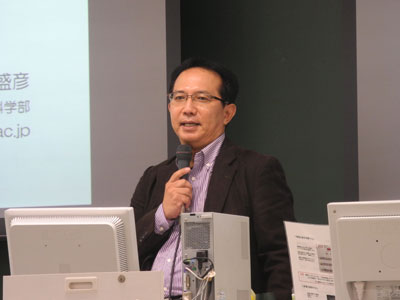Jul 14, 2016
On Monday, June 27, 2016, RCAPS welcomed Professor Prof. Tuong Vu (University of Oregon) to deliver an RCAPS seminar entitled, " Asia's Changing Security Environment and the Dilemmas for Vietnam and Southeast Asia ". The seminar was held in English.
- TOPIC
- セミナー
Jun 13, 2016
On Wednesday, June 8, 2016, RCAPS welcomed Professor Kaoru Natsuda (APM, APU) to deliver an RCAPS current research seminar entitled, "Development of the Automotive Industry in Southeast Asia and Central Europe". The seminar was held in English.
- TOPIC
- セミナー
Jun 10, 2016
Philippines - Japan Strengthening Strategic Partnership in the Asia-Pacific: Views from Both Sides
On Wednessday, May 18, 2016, RCAPS welcomed Ambassador Toshiba Urabe, former Japanese Ambassador to the Philippines and Minister and Consul General Marian Jocelyn R. Tirol-Ignacio to deliver an RCAPS seminar entitled, "APU DIPLOMATIC FORUM Philippines- Japan Strengthening Strategic Partnership in the Asia-Pacific: Views from Both Sides". The seminar was held in English.
- TOPIC
- セミナー
Dec 21, 2015
On November 18 (Wed.), 2015, RCAPS welcomed Professor Morihiko Kinjo (Faculty of
Tourism Sciences and Industrial Management, University of the Ryukyus) to deliver
an RCAPS seminar entitled, "Issues on Tourism Macro Statistics.”
[Report by APM Professor Mariner Wang]
In his 70 minute seminar, Professor Morihiko Kinjo (Faculty of Tourism Sciences
and Industrial Management, University of the Ryukyus) talked about ①the current
situation and challenges of tourism on Okinawa, ②challenges and policies for
tourism on Okinawa, ③the Okinawa General Bureau’s efforts to promote tourism,
④whether or not the economic effect of tourism is overestimated by the
input-output model? ⑤whether or not TSA (Tourism Satellite Account) is useless.
Professor Kinjo first explained, using graphs, the current situation and challenges
of tourism on Okinawa; then showed the transition in the number of inbound tourists
and revenues from tourism, the average duration of stay, and the average amount
consumed by per tourist; and concluded by discussing the future and challenges of
tourism on Okinawa (how to extend duration of stay, expand foreign tourists, and
increase amount consumed per tourist), using statistical data and graphs.
Specifically, he discussed efforts for achieving longer duration of stay and
increasing the amount consumed by tourists, measures for including Okinawan
culture in tour menus, infrastructure building to mitigate traffic congestion for
smooth transportation, economic effects from tourism on Okinawa, and international
standards of how to measure the economic impact from tourism.
In the Q&A session, there were many questions from the floor. 30 minutes was
allocated for the Q&A session but it was extended by 10 more minutes and the
seminar finished at 17:10.
The seminar was a substantial one. It was surely very informative for the attendees.

Professor Morihiko KINJO
- TOPIC
- セミナー
Dec 18, 2015
On Wednessday, December 9, 2015, RCAPS welcomed Professor Shin Kwang-Yeong(Department of
Sociology, Chung-Ang University) to deliver an RCAPS seminar entitled, "Multiple Social
Crises in South Korea: A Sociological Analysis". The seminar was held in English.
[Report by APS Professor Shinji Kojima]
Using tables and other visual representations, Professor Shin gave a talk on the rising
socio-economic issues in contemporary South Korea. He began by elaborating on the 1997
financial crisis and the ensuing neoliberal reforms undertaken by the Korean government.
One of the most significant consequences to the Korean society was the casualization of
work, with increasing number of workers employed under insecure, precarious
arrangements. Given the low level of social expenditure, more men and women of the
working age are suffering from unstable employment and of poverty. In conjunction with the
casualization of work, Professor Shin identified three crises the society is facing:
rapid aging, high suicide rate, and the dissolution of family as observed in the recent
rise of divorce rate. These phenomena have simultaneously led to the construction of an
unequal society. The Q&A session was a lively one. The audience raised questions that
compared their own country’s situation with the Korean case. Some students from Korea
were concerned with educational inequality, while others questioned the nature of inequality
from the standpoint of gender/women.
- TOPIC
- セミナー
